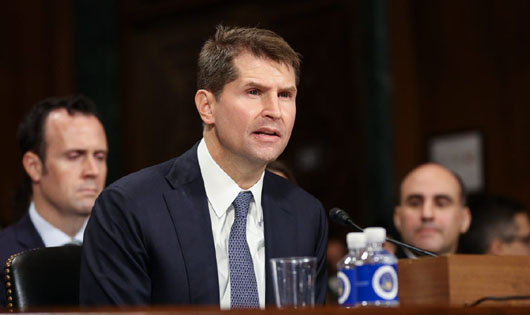Special to WorldTribune.com
Beijing’s ability to get at foreign technology and finances through its ultra sophisticated spying network is becoming a major threat to the U.S. and other Western societies.
E.W. Priestap, assistant director of the FBI’s Counterintelligence Division told a Senate committee, Chinese spying threatens “not just the future of the United States, but the future of the world.”

Priestap warns that the Chinese Communist regime uses unconventional intelligence assets to pilfer American secrets both from both the government and the private sector. That leads to “a hypercompetitive world” in which China uses economic theft to cement their status as a major international power. Priestap urged lawmakers to brace for “a hypercompetitive world” in which China uses economic theft to cement their status as a major international power.
“[S]o we are right to shore up our defenses against this,” he told the Senate Judiciary Committee. “Our efforts must inspire other nations to preserve similar systems. We must persuade them to choose freedom, reciprocity, and the rule of law. What hangs in the balance is not just the future of the United States, but the future of the world.”
If we don’t, he said: “Make no mistake: The Chinese government is proposing itself as an alternative model for the world, one without a democratic system of government, and it is seeking to undermine the free and open rules-based order we helped establish following World War II.”
Priestap warned “[T]he Chinese government understands a core lesson of the Cold War between the United States and the Soviet Union: Economic strength is the foundation of national power,” he said. “The competition between the United States and China will be greatly influenced, if not ultimately decided, on the strength of our economies.”
Another senior CIA official, Michael Collins, the CIA’s deputy assistant director for the East Asia Mission Center, told the Aspen Security Forum: “What they’re waging against us is fundamentally a cold war….At the end of the day, the Chinese fundamentally seek to replace the United States as the leading power in the world,”
Although Priestap stipulated that not every Chinese national is a spy, he warned: “Not meaning every person in the society is posing the threat but people from all walks of life — you can’t effectively combat that threat with ad hoc responses,” he said. “We need more people in government, more people in business, more people in academia pulling in the same direction to combat this threat effectively.”
He said the Chinese spy services regard expatriate students and workers in the United States as potential assets. “[The intelligence officials] think of them as — just simply an extension of their power, of their nation. “Based on FBI interaction with some of those individuals, it really is a case-by-case basis. Some I think are not knowledgeable in the least and are completely unwitting of doing anything in furtherance of their government aims. And, others either through direct or other softly applied pressure understand that they have obligations to meet.”
Priestap suggested that the U.S. government mitigate the risk of potential espionage. “However, we must also make certain that, as we address the loopholes and vulnerabilities within our system, we do not simultaneously undermine the open, free, and fair principles that have made it thrive,” he testified.
Sol W. Sanders, ([email protected]), is a contributing editor for WorldTribune.com and Geostrategy-Direct.com.

